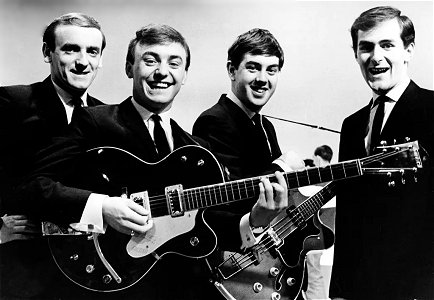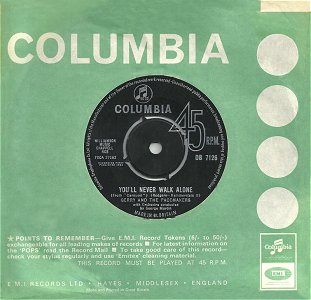Sixties
City presents
a wide-ranging series of
articles on all aspects of the Sixties, penned by the creator of the iconic
60s music paper Mersey
Beat
|
Sixties
City presents
a wide-ranging series of
articles on all aspects of the Sixties, penned by the creator of the iconic
60s music paper Mersey
Beat
|
|||||
|
 |
Written
by Richard Rogers and Oscar Hammerstein, the hit single by Gerry & The
Pacemakers was produced by Ron Richards and George Martin on Columbia
DB 7126. When Gerry & The Pacemakers topped the British charts with ‘You’ll
Never Walk Alone' it became the group’s biggest selling single, with sales
exceeding 800,000 copies.
It also marked a new record in British chart history by becoming The Pacemakers' third consecutive chart-topper, earning their place in ‘The Guinness Book of Records'. It was a record not equalled until 1984 when another Liverpool group, Frankie Goes to Hollywood, also topped the charts with their first three single releases. If a song from a Broadway musical may seem a strange choice for a Liverpool rock ‘n’ roll band to adopt, it’s not hard to understand if you consider the repertoires of Mersey bands at the time. The Beatles themselves performed ‘Till There Was You’ from the musical ‘The Music Man’ and they also recorded the number with George Martin. Other Liverpool bands performed their own rock versions of standards such as ‘Over the Rainbow’ from ‘The Wizard of Oz’ and ‘Summertime’ from ‘Porgy and Bess'. Rogers & Hammerstein composed ‘You’ll Never Walk Alone’ for their musical ‘Carousel’. The teenager Gerry Marsden was alone when he went to see the film at the Forum Cinema in Liverpool and was immediately struck by the sentiments of the song, sung in the picture by Shirley Jones. He was to recall, “The melody was beautiful, the dramatic effect was strong, and I immediately loved the sentiment of the message”. He first introduced the number into the group’s act when they were performing in Hamburg because he wanted a contrast to the rock ‘n’ roll numbers in their repertoire. Gerry & The Pacemakers topped the charts with ‘How Do You Do It?’ a number penned by Mitch Murray, which had been rejected by The Beatles. Their follow-up, another Mitch Murray number, 'I Like It’, also topped the charts. Serious consideration had to be given to their third release. Mitch Murray had offered them a song called ‘You Can’t Fool Me’, but Gerry wasn’t too happy with their recording of the number, which ended up on one of the groups EP’s. The Beatles also offered them ‘Hello Little Girl’ which Gerry rejected. The Fourmost were to record the number, which reached No9 in the charts. It was Gerry himself who finally decided he’d like to take a chance and record ‘You’ll Never Walk Alone’ which, being a ballad, contrasted with the two up-beat pop numbers which had proved so popular. Gerry thought it was time he proved he had more range than the pop ditties indicated. Producer Ron Richards, George Martin’s assistant, discussed the subject of the third single with Gerry. He’d had a talk with another EMI producer, Norrie Paramour, who had recently recorded Frank Ifield’s chart-topper ‘I Remember You’. Paramour told him that the number had been the most popular song in Ifield’s act. Richards asked Gerry which song went down best with his audiences. Gerry told him it was ‘You’ll Never Walk Alone’. When Gerry told his manager, Brian Epstein, that he wanted to record ‘You’ll Never Walk Alone’ Epstein disagreed and told him, “We want another number one from you and we just don’t think that’s strong enough”. |
| When he
recorded the number, Gerry gave it his own distinctive treatment, which
included introducing breaks in the middle of the title. Richard was initially
horrified at the treatment Gerry was giving to a number regarded as a classic.
He was to recall, “I didn’t say anything at the session, but if it had been
a new song I don’t think I’d have let Gerry get away with it”. When the
song was released, it was reviewed in Melody Maker by fellow Liverpool singer
Frankie Vaughan, who commented that it was “absolutely marvellous. You wouldn’t
expect the song from Gerry, but he makes a great job of it. Imagine it –
the beat world doing a ballad. But his diction is unmistakably Liverpudlian.
His personality still comes across. I like this enormously. It has lots
of charm and I’d say it stands a good chance”. The number became Gerry’s
fastest selling single, immediately entering the charts at No18 on October
12th 1963, reaching No7 the following week and then leap-frogging The Beatles
‘She Loves You’ to the top of the charts on November 2nd, where it remained
for two weeks before giving way to ‘She Loves You'. The song was No1 in the charts on November 22nd, the day President Kennedy was assassinated. A few weeks after ‘You’ll Never Walk Alone' was released, the crowd at Liverpool Football Club sang it at Anfield. It soon became the Liverpool football anthem, sung at The Kop End of the ground. Eventually, football clubs throughout the country adopted it. Gerry then received a phone call from Liverpool FC’s legendary manager Bill Shankly, who told him, “You’re an inspiration for Liverpool football, my son”. When Shankly died, the special ‘Shankly Gates’ were installed at the entrance to the club in his memory. Gerry was asked if he’d mind if the words ‘You’ll Never Walk Alone’ were put on the gates. He said he felt honoured. At the memorial service for Shankly, which took place at Liverpool Cathedral, Bill Shankly’s wife Nessie asked Gerry if he would sing the song. Gerry went to the altar with his guitar and sang ‘You’ll Never Walk Alone’, joined by the congregation and the 5,000 people gathered outside the cathedral. May 11th 1985 saw the shocking tragedy at the Valley Parade ground in Bradford when the stand caught fire and 57 people were killed. Gerry decided to make a charity record to aid the families of the victims. Initially he had thought of recording ‘You’ll Never Walk Alone’ with members of the Bradford football team, but the tragedy was too close for them to bear, so Gerry set out to record it with a celebrity line-up, which he called The Crowd. They included: Tony Christie, Rick Wakeman, John Conteh, The Barron Knights, Jess Conrad, Kiki Dee, Bruce Forsyth, The Foxes, Rolf Harris, Graham Gouldman, Kenny Lynch, Keith Chegwin, Tony Kicks, Colin Blunstone, Tim Hinckley, Johnny Logan, Zak Starkey, Girls School, Black Lace, John Otway, Gary Holton, Peter Cook, The Nolans, John Entwistle, Motorhead, Karen Clark, Dave Lee Travis, Graham Dene, Ed Stewart, Phil Lynott, Smokie, Joe Fagin, Eddie Harding, Gerald Kenny, Chris Robinson, Tim Healey, Kin Kelly, John Verity, Rose Marie, David Shilling, Chris Norman, Pete Spencer and Bernie Winters. Paul McCartney contributed some words on the ‘B’ side of the record. ‘You’ll Never Walk Alone’ by The Crowd entered the charts at No4 and then leapt to No1 on June 1st 1985. This gave Gerry another ‘first’ in British recording history, by becoming the first person ever to top the charts with two versions of the same number. |
 |
|
Article
Text
UK
web hosting by
|